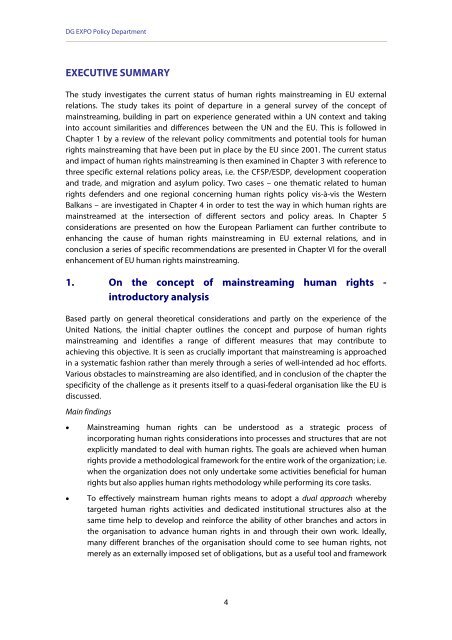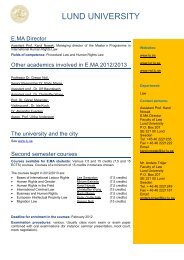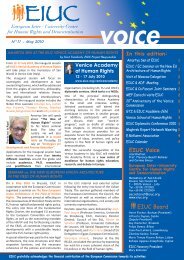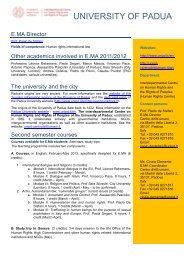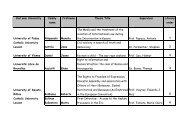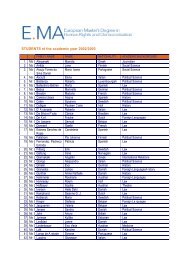study human rights mainstreaming in eu's external relations - EIUC
study human rights mainstreaming in eu's external relations - EIUC
study human rights mainstreaming in eu's external relations - EIUC
Create successful ePaper yourself
Turn your PDF publications into a flip-book with our unique Google optimized e-Paper software.
DG EXPO Policy Department<br />
EXECUTIVE SUMMARY<br />
The <strong>study</strong> <strong>in</strong>vestigates the current status of <strong>human</strong> <strong>rights</strong> <strong>ma<strong>in</strong>stream<strong>in</strong>g</strong> <strong>in</strong> EU <strong>external</strong><br />
<strong>relations</strong>. The <strong>study</strong> takes its po<strong>in</strong>t of departure <strong>in</strong> a general survey of the concept of<br />
<strong>ma<strong>in</strong>stream<strong>in</strong>g</strong>, build<strong>in</strong>g <strong>in</strong> part on experience generated with<strong>in</strong> a UN context and tak<strong>in</strong>g<br />
<strong>in</strong>to account similarities and differences between the UN and the EU. This is followed <strong>in</strong><br />
Chapter 1 by a review of the relevant policy commitments and potential tools for <strong>human</strong><br />
<strong>rights</strong> <strong>ma<strong>in</strong>stream<strong>in</strong>g</strong> that have been put <strong>in</strong> place by the EU s<strong>in</strong>ce 2001. The current status<br />
and impact of <strong>human</strong> <strong>rights</strong> <strong>ma<strong>in</strong>stream<strong>in</strong>g</strong> is then exam<strong>in</strong>ed <strong>in</strong> Chapter 3 with reference to<br />
three specific <strong>external</strong> <strong>relations</strong> policy areas, i.e. the CFSP/ESDP, development cooperation<br />
and trade, and migration and asylum policy. Two cases – one thematic related to <strong>human</strong><br />
<strong>rights</strong> defenders and one regional concern<strong>in</strong>g <strong>human</strong> <strong>rights</strong> policy vis-à-vis the Western<br />
Balkans – are <strong>in</strong>vestigated <strong>in</strong> Chapter 4 <strong>in</strong> order to test the way <strong>in</strong> which <strong>human</strong> <strong>rights</strong> are<br />
ma<strong>in</strong>streamed at the <strong>in</strong>tersection of different sectors and policy areas. In Chapter 5<br />
considerations are presented on how the European Parliament can further contribute to<br />
enhanc<strong>in</strong>g the cause of <strong>human</strong> <strong>rights</strong> <strong>ma<strong>in</strong>stream<strong>in</strong>g</strong> <strong>in</strong> EU <strong>external</strong> <strong>relations</strong>, and <strong>in</strong><br />
conclusion a series of specific recommendations are presented <strong>in</strong> Chapter VI for the overall<br />
enhancement of EU <strong>human</strong> <strong>rights</strong> <strong>ma<strong>in</strong>stream<strong>in</strong>g</strong>.<br />
1. On the concept of <strong>ma<strong>in</strong>stream<strong>in</strong>g</strong> <strong>human</strong> <strong>rights</strong> -<br />
<strong>in</strong>troductory analysis<br />
Based partly on general theoretical considerations and partly on the experience of the<br />
United Nations, the <strong>in</strong>itial chapter outl<strong>in</strong>es the concept and purpose of <strong>human</strong> <strong>rights</strong><br />
<strong>ma<strong>in</strong>stream<strong>in</strong>g</strong> and identifies a range of different measures that may contribute to<br />
achiev<strong>in</strong>g this objective. It is seen as crucially important that <strong>ma<strong>in</strong>stream<strong>in</strong>g</strong> is approached<br />
<strong>in</strong> a systematic fashion rather than merely through a series of well-<strong>in</strong>tended ad hoc efforts.<br />
Various obstacles to <strong>ma<strong>in</strong>stream<strong>in</strong>g</strong> are also identified, and <strong>in</strong> conclusion of the chapter the<br />
specificity of the challenge as it presents itself to a quasi-federal organisation like the EU is<br />
discussed.<br />
Ma<strong>in</strong> f<strong>in</strong>d<strong>in</strong>gs<br />
• Ma<strong>in</strong>stream<strong>in</strong>g <strong>human</strong> <strong>rights</strong> can be understood as a strategic process of<br />
<strong>in</strong>corporat<strong>in</strong>g <strong>human</strong> <strong>rights</strong> considerations <strong>in</strong>to processes and structures that are not<br />
explicitly mandated to deal with <strong>human</strong> <strong>rights</strong>. The goals are achieved when <strong>human</strong><br />
<strong>rights</strong> provide a methodological framework for the entire work of the organization; i.e.<br />
when the organization does not only undertake some activities beneficial for <strong>human</strong><br />
<strong>rights</strong> but also applies <strong>human</strong> <strong>rights</strong> methodology while perform<strong>in</strong>g its core tasks.<br />
• To effectively ma<strong>in</strong>stream <strong>human</strong> <strong>rights</strong> means to adopt a dual approach whereby<br />
targeted <strong>human</strong> <strong>rights</strong> activities and dedicated <strong>in</strong>stitutional structures also at the<br />
same time help to develop and re<strong>in</strong>force the ability of other branches and actors <strong>in</strong><br />
the organisation to advance <strong>human</strong> <strong>rights</strong> <strong>in</strong> and through their own work. Ideally,<br />
many different branches of the organisation should come to see <strong>human</strong> <strong>rights</strong>, not<br />
merely as an <strong>external</strong>ly imposed set of obligations, but as a useful tool and framework<br />
4


